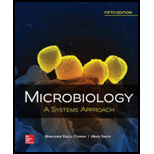
Introduction:
Antibiotics are sometimes naturally formed chemicals which are released by soil
Answer to Problem 1MCQ
Correct answer:
A compound synthesized by bacteria or fungi that destroys or inhibits the growth of other microbes is an antibiotic. Therefore, option (b) is correct.
Option (b) is given as “antibiotic”.
Explanation of Solution
Justify reasons for the correct statement:
Antibiotics can be produced only by a living organism such as bacteria. Antibiotics can be generated either alone or by different groups of microorganisms such as bacteria, actinomycetes,and fungi. More than thirty antibiotics have been isolated from those groups. Microbes that can produce antibiotics are useful for the prevention and treatment of many diseases including bacterial and fungal disease. For example, penicillin and tetracycline.
Hence, option (b) is correct.
Justify reasons for the incorrect statements:
Option (a) is given as “synthetic drug”.
Drugs that are synthesized in the laboratory by mimic the action of natural compounds by
Option (c) is given as “interferon”.
Interferon, a human-based compound that is a glycoprotein. It is produced by leukocytes and fibroblasts in response to many immune responses. Hence, it is a wrong answer.
Option (d) is given as “competitive inhibitor”.
A form of enzyme inhibition that contains the binding of an inhibitor that preventsthe binding of the target molecule of the enzyme is termed as a competitive inhibitor. Hence, it is a wrong answer.
Hence, options (a),(c), and(d) are incorrect.
Antibiotics eradicate the bacteria that are susceptible to departing from the resistant
Want to see more full solutions like this?
Chapter 12 Solutions
Microbiology: A Systems Approach
- Which of the following is NOT used to treat active viral disease? a. Vaccines b. Antiviral drugs c. Antibiotics d. Phage therapyarrow_forwardSome antibiotics fail to kill/inhibit a pathogen simply because the microbe is naturally (intrinsically) resistant to it. True or False ?arrow_forwardDrugs are often given to surgical patients, to dental patients with heart disease, or to healthy family members exposed to contagious infections. a. What word would you use to describe this use of drugs? b. What is the purpose of this form of treatment? c. Explain some potential undesired effects of this form of therapy. d. Defi ne probiotics and give some ways they are used.arrow_forward
- Technically speaking, true antibiotics are drugs… A. Produced naturally by microbes B. Taken orally, not injected. C. Used to treat any microbial infection D. Used to treat any bacterial disease.arrow_forwardDrugs are often given to patients before going into surgery, to dentalpatients with heart disease, or to healthy family members exposed tocontagious infections.a. What word would you use to describe this use of drugs?b. What is the purpose of this form of treatment?c. Explain some potential undesired effects of this form of therapy.d. Define probiotics and list some ways they are used.arrow_forwardBased on what you know about the cells of the immune system, do you suspect this patient to have an infection, and if so, what is a probable cause? Choose the best answer and explain. a) Yes, a possible viral infection is indicated. b) Yes, a possible fungal infection is indicated. c) Yes, a possible bacterial infection is indicated. d) No, an infection is not indicated.arrow_forward
- Which of the following would not help a virus avoid triggeringan adaptive immune response?(A) having frequent mutations in genes for surface proteins(B) infecting cells that produce very few MHC molecules(C) producing proteins very similar to those of other viruses(D) infecting and killing helper T cellsarrow_forwardWhich of the following is a viral disease that destroys the immune system? A) anemia B) HIV-AIDS C) asthma D) tuberculosisarrow_forwardDiscuss the process and give example on the following below: a. DNA Microarray Technology b. Single-Cell Technologies c. CAR T-Cell Immunotherapy Answer a,b,carrow_forward
- Write a 200-300-word reflective essay on the emerging case of Antibiotic Resistance and what is your standpoint? How can you help to combat this threat?arrow_forwardFor question with blanks, choose the combination of answers that most accurately completes the statement.A living microbe with reduced virulence that is used for vaccination is considered a. a toxoid c. denatured b. attenuated d. an adjuvantarrow_forwardMost antiviral drugs: a) damage the cell wall b) are nucleoside analogs c) are enzymes inhibitors d) prevent viruses from entering cells e) damage the plasma membranearrow_forward
 Comprehensive Medical Assisting: Administrative a...NursingISBN:9781305964792Author:Wilburta Q. Lindh, Carol D. Tamparo, Barbara M. Dahl, Julie Morris, Cindy CorreaPublisher:Cengage LearningBasic Clinical Lab Competencies for Respiratory C...NursingISBN:9781285244662Author:WhitePublisher:Cengage
Comprehensive Medical Assisting: Administrative a...NursingISBN:9781305964792Author:Wilburta Q. Lindh, Carol D. Tamparo, Barbara M. Dahl, Julie Morris, Cindy CorreaPublisher:Cengage LearningBasic Clinical Lab Competencies for Respiratory C...NursingISBN:9781285244662Author:WhitePublisher:Cengage


